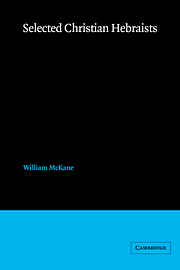Book contents
- Frontmatter
- Contents
- Preface
- List of abbreviations
- Introduction
- 1 The foundations
- 2 Andrew of St Victor
- 3 William Fulke and Gregory Martin
- 4 Richard Simon
- 5 Alexander Geddes
- Conclusion
- APPENDICES
- 1 The Milan palimpsest
- 2 The Septuagint text used by Origen in his homily on the book of Jeremiah
- 3 Jerome's use of the Septuagint in his commentary on Jeremiah
- 4 Andrew of St Victor on Isaiah i 31
- 5 William Fulke on Isaiah xxviii 11 and 1 Corinthians xiv 21
- Notes
- Select bibliography
- General index
- Index of modern authors
- Scripture references
- Index of early Christian Literature
2 - The Septuagint text used by Origen in his homily on the book of Jeremiah
Published online by Cambridge University Press: 18 December 2009
- Frontmatter
- Contents
- Preface
- List of abbreviations
- Introduction
- 1 The foundations
- 2 Andrew of St Victor
- 3 William Fulke and Gregory Martin
- 4 Richard Simon
- 5 Alexander Geddes
- Conclusion
- APPENDICES
- 1 The Milan palimpsest
- 2 The Septuagint text used by Origen in his homily on the book of Jeremiah
- 3 Jerome's use of the Septuagint in his commentary on Jeremiah
- 4 Andrew of St Victor on Isaiah i 31
- 5 William Fulke on Isaiah xxviii 11 and 1 Corinthians xiv 21
- Notes
- Select bibliography
- General index
- Index of modern authors
- Scripture references
- Index of early Christian Literature
Summary
The nature of the Greek text cited by Origen when he was preaching on the book of Jeremiah can be tested by picking out the cases where there is a difference between the text of the Septuagint, as measured by Ziegler's text or that of Codex Vaticanus, and the text of the Hebrew Bible, and by searching Origen's quotations for instances of these. When this is done for Jeremiah i–xxv, the results obtained may be set out as follows:
A. There are examples of a quantitative equivalence between Origen's Greek text and the text of the Hebrew Bible. The additions which are made to the Septuagint to achieve this are recorded in the Hexaplaric material assembled by Field and Ziegler. We may conclude in these instances that Origen is using the text which he had constructed in the fifth column of his Hexapla.
B. There are two quotations which have additions made under the influence of the Hebrew text, but which are not completely equalized with the Hebrew text. Again these additions can be traced in the remains of the Hexapla and are Hexaplaric.
C. There are eleven examples of a Greek text which coincides with the text of Ziegler or that of Codex Vaticanus and which has no Hexaplaric additions. That these additions were made to the Septuagint in the fifth column of the Hexapla, in respect of these particular passages, is shown by their existence in the Hexaplaric remains recorded by Field and Ziegler.
D. There are three quotations in which the differences between the Septuagint and the Massoretic text are other than quantitative.
- Type
- Chapter
- Information
- Selected Christian Hebraists , pp. 197 - 198Publisher: Cambridge University PressPrint publication year: 1989



